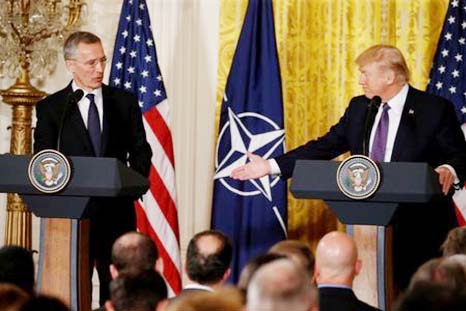
Reuters, Brussels :
France and Germany are resisting a plan by U.S. officials for NATO to take a bigger role in the fight against Islamic State in Syria and Iraq, in line with calls from President Donald Trump for the alliance to do more to combat terrorism.
Many alliance members hope the plan will be announced in Brussels next Thursday, when Trump attends his first NATO summit. But France and Germany have misgivings, allies involved in the discussions said. Among the concerns: NATO might be caught up in another costly, Afghan-style deployment, irk some Arab countries or risk confrontation with Russia in Syria.
“They are not buying it,” said a senior European NATO diplomat, who said some other nations including Greece and Italy were also wary of the plan.
“They want to know what difference would it make. All 28 NATO allies are already part of this effort,” the diplomat said, referring to a 68-nation U.S.-led coalition against Islamic State that includes all NATO members.
French and German officials declined to comment, but German Chancellor Angela Merkel left open the possibility of NATO as an institution joining the coalition when she met NATO Secretary General Jens Stoltenberg last week. Both ruled out any combat role for NATO in Syria and Iraq.
France’s new President Emmanuel Macron will have lunch with Trump – who last month withdrew his earlier charge that NATO was ‘obsolete’ because it was not ‘taking care of terror’ – before the Brussels meeting next Thursday.
While Islamic State is on the verge of defeat in its Iraqi stronghold of Mosul, and bracing for an assault against its de facto capital in Raqqa, Syria, U.S. officials are concerned fleeing militants could leave a vacuum that could prompt Arab tribal fighters to turn on each other to gain control.
U.S. officials say the North Atlantic Treaty Organisation as an institution could contribute equipment, training and the expertise it gained leading a coalition against al Qaeda and the Taliban in Afghanistan. NATO military chiefs favor the move, said General Petr Pavel, chairman of the alliance’s military committee. Diplomats said this could mean NATO using its surveillance planes over Syria, running command-and-control operations and providing air-to-air refueling.
One compromise would be for NATO as an institution to formally join the coalition at the dinner with Trump next week, but leave the details of any involvement to a later stage. “If allies can be convinced that it is only a symbolic step, a deal should be possible,” said a second NATO diplomat. “Trump goes home with a message that NATO is joining the coali
France and Germany are resisting a plan by U.S. officials for NATO to take a bigger role in the fight against Islamic State in Syria and Iraq, in line with calls from President Donald Trump for the alliance to do more to combat terrorism.
Many alliance members hope the plan will be announced in Brussels next Thursday, when Trump attends his first NATO summit. But France and Germany have misgivings, allies involved in the discussions said. Among the concerns: NATO might be caught up in another costly, Afghan-style deployment, irk some Arab countries or risk confrontation with Russia in Syria.
“They are not buying it,” said a senior European NATO diplomat, who said some other nations including Greece and Italy were also wary of the plan.
“They want to know what difference would it make. All 28 NATO allies are already part of this effort,” the diplomat said, referring to a 68-nation U.S.-led coalition against Islamic State that includes all NATO members.
French and German officials declined to comment, but German Chancellor Angela Merkel left open the possibility of NATO as an institution joining the coalition when she met NATO Secretary General Jens Stoltenberg last week. Both ruled out any combat role for NATO in Syria and Iraq.
France’s new President Emmanuel Macron will have lunch with Trump – who last month withdrew his earlier charge that NATO was ‘obsolete’ because it was not ‘taking care of terror’ – before the Brussels meeting next Thursday.
While Islamic State is on the verge of defeat in its Iraqi stronghold of Mosul, and bracing for an assault against its de facto capital in Raqqa, Syria, U.S. officials are concerned fleeing militants could leave a vacuum that could prompt Arab tribal fighters to turn on each other to gain control.
U.S. officials say the North Atlantic Treaty Organisation as an institution could contribute equipment, training and the expertise it gained leading a coalition against al Qaeda and the Taliban in Afghanistan. NATO military chiefs favor the move, said General Petr Pavel, chairman of the alliance’s military committee. Diplomats said this could mean NATO using its surveillance planes over Syria, running command-and-control operations and providing air-to-air refueling.
One compromise would be for NATO as an institution to formally join the coalition at the dinner with Trump next week, but leave the details of any involvement to a later stage. “If allies can be convinced that it is only a symbolic step, a deal should be possible,” said a second NATO diplomat. “Trump goes home with a message that NATO is joining the coali

